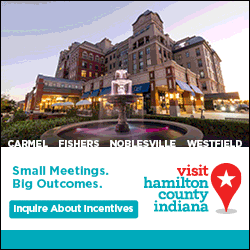Sponsored Content
Ithaca, New York, has long been on planners’ radars, but because its meeting spaces were limited, some meetings that wanted to land there couldn’t.
That changes in spring 2024, when the Ithaca Downtown Conference Center and its 15,000-square feet of meeting and pre-function space open.
At a recent tradeshow in Albany, planners expressed their excitement.
“People shared that they had wanted to come here in the past, but we just didn’t have the capacity for a group their size,” said Jason Humphrey, general manager of the conference center.
Ithaca – Where Great Minds Meet the Great Outdoors
If you haven’t been to Ithaca, you might not understand what makes it so appealing.
For one, it’s a college town twice over, home to Cornell University and Ithaca College, which sit on hills above a downtown anchored by a busy, hip pedestrian mall called The Commons.
Water and wine flow freely in the region. More than 150 waterfalls, several of them downtown, tumble through gorges gouged by glaciers.
Cayuga Lake, one of the 11 Finger Lakes, is the backdrop for this hidden gem community.
Humphrey describes his hometown as “forward-thinking, diverse … a small town with a big-city-mentality.” Some 30,000 college students from across the globe “keep us fresh,” he said.
Pioneering Sustainability: America’s First All-Electric Conference Center
The new conference center reflects Ithaca’s thoughtfulness about the future. It will be the first fully electric conference center in the United States, in line with Ithaca’s goal to be carbon neutral by 2030.
The center encompasses the first three stories of a new 12-story high-rise, around the corner from The Commons. Apartments will fill the other floors.
Meeting spaces are on the first two levels; administrative spaces are on the third floor. Meeting space includes a 10,800-square-foot divisible ballroom with 18-foot ceilings; a 3,800-square-foot divisible junior ballroom and a 520-square-foot boardroom with built-in AV and views of downtown. Operated by ASM Global, the center is owned by a nonprofit created to drive downtown economic development.
Running an all-electric facility will be an exciting endeavor. The new chef for the conference center didn’t even flinch at an all-electric kitchen. He’d been a chef on cruise ships, where kitchens are always all-electric for safety reasons.
“The conference center being fossil-free reflects our community values,” said Peggy Coleman, vice president of tourism and director of Visit Ithaca, the local CVB. “We want to respect nature and ensure future generations will enjoy it as well.”
Leave Your Car Behind: The Convenience of Downtown Ithaca
Everything meeting attendees need, from guest rooms and restaurants to shopping and entertainment—is a few paces away from the conference center. “We are a park once, pedestrian-friendly destination,” said Coleman.
Four downtown hotels have a total of 564 rooms, all a short walk from the center. The 159-room Ithaca Marriott Downtown on the Commons, opened in 2015, has 3,000 square feet of meeting space. The newest hotel, the 123-room Canopy by Hilton Ithaca Downtown, has two small meeting rooms. The renovated 170-room Hotel Ithaca has 6,000 square feet of meeting space. The Hilton Garden Inn, opened in 2005, has 104 guest rooms.
“Our downtown hotels work well together,” said Coleman. “It’s a collaborative relationship and all are about equidistant from the conference center.”
Another meeting option, on Cornell’s campus, is The Statler Hotel at Cornell University. The 153-room hotel has 11,000 square feet of meeting space and is a learning lab for students from the university’s hospitality school. “The Statler is as engaged in hosting meetings that aren’t related to the university as it is in supporting meeting business at Cornell,” said Coleman.
In addition to hotel meeting spaces, downtown theaters can supplement the conference center’s meeting space. The State Theatre of Ithaca, a 1,600-seat beauty, and Cinemapolis, a modern, five-screen theater complex, can be used for lectures during off hours.
When events like graduation or game days put pressure on downtown hotels, the CVB will support meetings at the conference center with shuttle service to the 1,300 hotel rooms beyond downtown, Coleman said.
Uncommon fun at The Commons
It’s likely meeting attendees will spend their spare time exploring the four sprawling blocks of The Commons, popping in and out of more than 100 local businesses like bookstores; a record store; bike, skateboard and guitar shops; a glass art gallery; vintage clothiers; and a “green” home store. When hunger hits, restaurants along downtown’s Restaurant Row on Aurora Street will suit any palette with a plethora of cuisines to choose from.
“People think Ithaca must be rural, and while we do have the beauty of a rural setting, it is also very urban,” said Coleman.
Visitors will also notice Ithaca’s commitment to sustainability and knack for reuse goes far beyond recycling and composting. One store downtown resells leftover fabrics and yarns; another markets used clothing while still another salvages and resells building materials. Farm-to-Fork dining is the norm as many establishments grow their own fresh produce and incorporate it into seasonally inspired menus.
The shoreline of Cayuga Lake in Ithaca is also lined with places to explore. The Ithaca Farmers Market at Steamboat Landing showcases the region’s rich agricultural economy. You can catch a boat tour on Discover Cayuga Lake at several locations along the lake shore. Stewart Park also has plenty of outdoor lakefront space including an accessible nature trail and playground. This park also was home to a studio used in the silent film industry which will be renovated and repurposed as a Silent Film Museum, showcasing Ithaca as the birthplace of silent films.
One Connection Away: Ithaca’s Accessibility
Although New York planners are familiar with Ithaca’s accessibility, meeting planners beyond the state might not be. Ithaca is not on an interstate highway, but good secondary roads link it to Interstate 81 and Interstate 86, each about 30 minutes away. New York City is a four-hour drive; Buffalo and Albany are three hours in either direction and it’s about six hours to either Washington, D.C. or Boston.
The local airport, Ithaca-Tompkins International Airport, recently achieved its international status and has direct nonstop flights daily to JFK and Newark. “For any destination, we are one connection away from all of the U.S.,” said Coleman.
Just one more reason Ithaca is now on a lot of meeting planners’ radars.
For more information, please contact:
Visit Ithaca
Lisa Conarton
Conference Sales Manager
607-272-1313 (o)
570-954-9443 (c)











